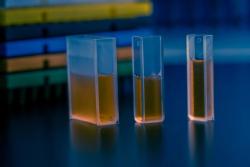
OR WAIT null SECS
- About Us
- Advertise
- Contact Us
- Editorial Info
- Editorial Advisory Board
- Do Not Sell My Personal Information
- Privacy Policy
- Terms and Conditions
© 2026 MJH Life Sciences™ , Pharmaceutical Technology - Pharma News and Development Insights. All rights reserved.
PharmaFluidics Offers Second-Gen µPAC Technology for Single Cell Proteomics
The new ultra-sensitive second-generation micro-chip technology is a key enabler in advanced single-cell proteomics workflow.
Researchers of Karl Mechtler’s Group at the Research Institute for Molecular Pathology (IMP) in Vienna have achieved integration of their ultra-sensitive second-generation µPAC micro-Chip technology into their advanced single cell proteomics workflow, according to PharmaFluidics, a provider of life sciences instruments.
In a newly published joint study (available on bioRxiv), results showed a 10-fold increase in detection sensitivity, which was achieved using PharmaFluidics’ second-generation µPAC technology in an optimized workflow, as compared to previous reports, the company stated in a Feb. 17, 2021 press release. Key results in the study include untargeted and unbiased analysis achieving identification depth of over 2000 protein groups from as little as 500 picogram of HeLa protein tryptic digest.
“The microstructured and extremely reproducible µPAC microfluidic devices are conducive to the generation of high-quality data. With the further downscaling of the critical dimensions in our second-generation technology from 2.5 µm to 1.25 µm, we are now definitely opening a new league in proteomics LC [liquid chromatography], as indicated by the order of magnitude improvement in sensitivity for limited sample workflows,” said Paul Jacobs, co-founder and chief operating officer at PharmaFluidics, in the press release.
“We are grateful to IMP researchers for bringing PharmaFluidics’ technology to the forefront of protein biology, and to our own staff for relentless support to their fellow-scientists,” added Johan Devenyns, CEO of PharmaFluidics, in the press release.
Source: PharmaFluidics



